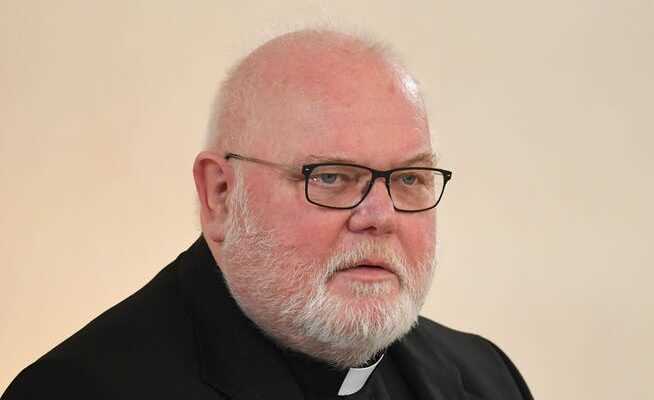Cardinal Reinhard Marx interprets the report, which also incriminates him, as a political mandate to act. The church must face its dark side. Concrete resolutions are missing, as are allegations against the former Pope Benedict XVI.
Marx presented his view of things at the Catholic Academy in Bavaria.
A week ago, a law firm commissioned by the Archdiocese of Munich and Freising presented a 1,900-page report on sexual violence in the church. All Munich archbishops since the end of the Second World War have received mixed to bad grades. Cardinal Friedrich Wetter, head of the diocese from 1982 to 2008, apparently acted least appropriately.
Wetter, who now lives in a nurses’ home, was not mentioned when the incumbent local bishop, Reinhard Marx, presented his perspective at a press conference. The former chairman of the German Bishops’ Conference confessed his shock, announced further clarification, promised a forced commitment to reforms and reported on the first personal consequences. Marx practiced a church-political forward defense.
A broadcasting council in the twilight
The report by the Westpfahl Spilker Wastl law firm describes the cathedral dean, head of the Catholic Office and chief diocesan church judge Lorenz Wolf as a dubious figure. He approached the law firm with two lawyers and refused to work on the report “with the exception of abstract, general statements”.
Although Wolf trivialized actions and protected the accused with his “cleric-friendly attitude”, he is said to have denied “any circumstances”. Marx announced that Wolf would rest his offices and tasks and would like to express himself in detail. Wolf also heads the Broadcasting Council of the Bavarian Broadcasting Corporation. He has handed over this position to his deputy until further notice.
The report accuses Marx of “acting incorrectly (legally) in three (suspected) cases of abuse and/or at least acting inappropriately in the handling of the matter”. At the press conference, Marx admitted that in one case “not really actively approached those affected”. In general, the church failed to recognize its own “dark side” and to take the perspective of those affected. That is unforgivable.
No judgment on a life’s work
He, Marx, recognizes his moral responsibility and apologizes to those affected, the faithful and the parishes. When looking at the report, he had to state: “We see a disaster.” A total of “at least 497 victims” and 235 accused clerics and laypeople are listed.
The involvement of Joseph Ratzinger, who later became Pope Benedict XVI, attracted international attention. According to the report, during his tenure in Munich from 1977 to 1982 there were five “(suspected) cases” in which he “did not react in accordance with the rules or appropriately”. In the well-known case of a pedophile priest who was transferred from the diocese of Essen to Munich in 1980, Ratzinger initially denied having attended the meeting in question.
He later admitted his presence, but no decision had been made “about a pastoral assignment by the priest concerned”. Marx did not want to part with Benedict XVI this Thursday. distance nor defend him. The “Papa emeritus” supported the clarification of the cases of abuse and will continue to express himself extensively. The report is not suitable for making judgments about a person’s life’s work.
Another church
With regard to the lessons from the report, Marx went on the church-political offensive. “Completely absurd” he called the speech of “abuse of abuse in the sense of preventing a reform of the church”. The attack is aimed at Bishop Rudolf Voderholzer of Regensburg, who uses this formulation to warn against a theological relativism and who is as conservative today as Marx himself was in the pontificate of Benedict XVI. gave.
Marx was “somewhat surprised” by the omissions of his former vicar general Peter Beer. The report reproaches him for not always taking the “required canonical measures”. In an interview with the weekly newspaper “Die Zeit” Beer complains that he failed due to resistance in the professorship. Marx explained smugly that he did not remember Beer as a man with little assertiveness.
The Cardinal’s recipes against a clerical shadow world that encourages abuse are canonical and labor law in nature. Marx wants a different church. He suggests changing canon 129 in canon law. It says that “those who have received holy orders” are entitled to take over leadership – without exception priests.
“That,” countered Marx, “doesn’t fit our time anymore.” The church must become synodal, “the basic requirement for a new church is synodality”, the coexistence of the sexes and the estates. Marx also rejects the church’s position that “manifest homosexuality” disqualifies for the priesthood. The only decisive factor “at the moment” is whether the “chaste way of life” is observed.
After the Munich report comes the Trier report
The report writes of “closely knit” homosexual networks “up to prominent positions in the hierarchy of the professorship”. When asked about this, Marx demanded that the “hypocrisy” of labor law stop in order to dry up any potential for blackmail. With this reference, Marx supports the demands of homosexual employees to abolish occupational restrictions imposed by church employers.
Those who expected further personnel or structural consequences were disappointed. In addition to Wolf’s withdrawal, the only concrete result is the announcement that a pastor will be established as an additional contact person for those affected and that the work of the contact points will be intensified.
As a former bishop of Trier, Marx is looking forward to the first interim report from the review commission there, which is scheduled for this spring. His Munich statements resulted in a rhetorical question to society: “Who else does it in such a radical way that we really face the truth?”
